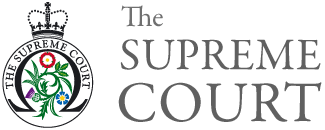Overview for litigants in person
This guide is a brief overview for people who want to bring a case to the Supreme Court who currently don't have legal representation. For further information please contact Registry. Please note the Registry is not able to provide any legal advice. For free legal advice or assistance, you can find a law centre in your area, or, alternatively, you can research local solicitors who may offer a free consultation regarding your appeal.
- What is the Supreme Court?
- What kind of cases are heard at the Supreme Court?
- Can I appeal to The Supreme Court?
- When does the Supreme Court grant permission to appeal?
- What are the restrictions on the right of appeal?
- Where can I find additional information?
What is the Supreme Court?
The Supreme Court is the highest court of appeal in the United Kingdom. Learn more about the Supreme Court.
What kind of cases are heard at the Supreme Court?
The Supreme Court is the final court of appeal for all UK civil cases and criminal cases from England and Wales, Northern Ireland and in some circumstance Scotland. Appeals where there is an arguable point of law of general public importance may be heard by the Court. For more information on The Supreme Court and United Kingdom's legal system please view the following PDF.
Can I appeal to The Supreme Court?
In most cases, appellants need permission to appeal to the Supreme Court from the lower court. Usually this means the Court of Appeal (in England and Wales and Northern Ireland) or the Court of Session (in Scotland). Appellants must ask the lower court for permission to appeal before making an application to the Supreme Court.
If you are refused permission by that lower court, you may still make your appeal to the Supreme Court, however you must go through that process first.
For more information on the appeal process for cases please select the following link which relates to your case.
Cases from – Court of Appeal in England, Wales and Northern Ireland
Cases from – Court of Session in Scotland
For further information please refer to the do I have the right to appeal section within the guide to bringing a case to The Supreme Court.
When does the Supreme Court grant permission to appeal?
The Supreme Court grants permission to appeal for applications that in the opinion of the Justices
A) involve an arguable point of law
B) Involve a point of law of general public importance
C) Ought to be considered at this time
What are the restrictions on the right of appeal?
Permission to appeal to the Supreme Court is subject to a few statutory restrictions. The most important restriction concerning the rights to appeal is section 54(4) of the Access to Justice Act 1999.
This states that the Supreme Court cannot consider an appeal where the Court of Appeal has refused permission to appeal to that court (i.e., to the Court of Appeal). It is only in exceptional circumstances that a case can be appealed directly from the High Court to the Supreme Court.
Many of those who apply for permission to appeal to the Supreme Court are disappointed by the refusal of permission. Please consider that the Court takes only a limited number of appeals, and the Justices have the sole responsibility of deciding which appeals raise points of law of the most general public importance. If permission to appeal is refused then that decision is final.
For further information please refer to the what are the restrictions on a right of appeal section within the guide to bringing a case to The Supreme Court.
